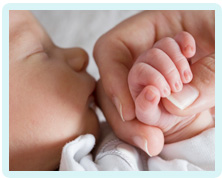
Failure To Diagnose Third Degree Tear
When Lilly gave birth to her first child, complications during labour meant that she needed a forceps delivery, and, sadly, she soon started to experience problems.
When Lilly was admitted to the Maternity Unit at her local hospital, she was told she was having a 'slow labour' and advised it would be some time before the baby could be delivered. As is often the case with slow labours, the midwives became concerned about the baby's heart rate, which seemed to be slowing with every contraction.
Without consulting Lilly, two doctors decided to deliver her son with the assistance of forceps, as they were becoming increasingly worried about the state of the baby's health. This caused Lilly considerable distress, as she did not know what was going on, and suddenly found herself in extreme pain. The doctors then left without discussing their actions with Lilly, who was then stitched up.
Lilly remained in hospital for another day and, despite telling staff she was in pain, no perineal examination was carried out - not even immediately after the birth. She was given very little information, and it was only when she read her own medical notes that Lilly discovered she had suffered a second degree tear.
The pain in Lilly's genital area remained severe, and after one week she began to notice she was passing faeces through her vagina. However, her GP advised that this was just heavy discharge which was perfectly normal. The GP took some swabs to check for infection and organised an ultra-sound, both of which failed to detect a problem.
Over the next four months there was no improvement in Lilly's condition. She saw a number of GPs during this time, all of whom diagnosed her with a urine infection.
Eventually Lilly was referred to a gynaecologist who, after an examination, told her she had suffered a third degree tear during childbirth - not a second degree tear as her medical notes said. This diagnosis was later confirmed by a specialist, who told Lilly that there was substantial damage to her sphincter muscles. She was also advised she would need surgery to repair the damage.
A whole year after her son was born, Lilly was correctly diagnosed with a third degree tear. Such a perineal tear should have been recognised by medical staff at the time of birth, whose duty it is to perform a thorough examination after every vaginal delivery. This is to ensure that all perineal tears are noticed and properly repaired.
Lilly did not receive such an examination, and as a result the seriousness of her condition was not diagnosed at the time of birth. This left her in considerable pain, and she needed constant help around the house and while looking after her son. She was also unable to return to work.
Glynns helped Lilly file a medical negligence claim, as we believed she had been the victim of a substandard level of care. After instructing different medical experts to prepare a report on her case, we negotiated a settlement with the Trust in question and Lilly was awarded over £50,000 in compensation.
(Details which might identify our client have been changed.)
Would You Like Assistance from Specialist Birth Injury Claims Solicitors?
If you would like to benefit from a service of excellence with total commitment to client care from a small and friendly team, Glynns are ready and waiting to help you.
Please call us on 0800 234 3300 (or from a mobile 01275 334030) or complete our Online Enquiry Form.



